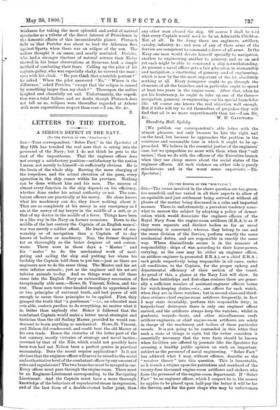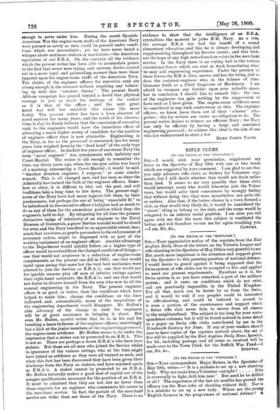(To THE EDITOR OF TEl "SPECTATOR?]
Sin,—The issues involved in the above question are too grave, too manifold, and too varied in all their aspects to allow of an equitable and just settlement being arrived at without all phases of the matter being discussed in a calm and impartial manner. There is, unfortunately, a prevalent tendency some- what to narrow the subject by adopting a policy of demar- cation which would dissociate the engineer officers of the Royal Navy from the engine-room artificers (E.R.A.'s) as if they were separate and distinct bodies so far as naval engineering is concerned; whereas they belong to one and the same division of the Service, perform exactly the same mechanical duties, and are responsible in exactly the same way. Where dissimilitude occurs is in the measure of responsibility : ships of war, according to their horse-power. carrying, as the case may be, either an engineer officer, an artificer engineer (a promoted E.R.A.), or a chief E.R.A. ; each grade respectively, being responsible in all cases, under all conditions, to the Captain, for the proper upkeep and departmental efficiency of their section of the vessel. As proof of this, a glance at the Navy List will show. In first-class battleships and first-class cruisers there are gener- ally a sufficient number of assistant-engineer officers borne for watch-keeping duties,—i.e., one officer for each watch, when they are in three watches; but in second-class and third- class cruisers chief engine-room artificers frequently, in fact I may state invariably, perform this responsible duty ; in torpedo-boat destroyers there is only one engineer officer carried, and the artificers always keep the watches ; whilst in gunboats, torpedo - boats, and other miscellaneous craft artificer engineers, or chief engine-room artificers, are solely in charge of the machinery and boilers of these particular vessels. It is not going to be contended in this letter that such a state of things is right, but the writer considers it essentially necessary that the true facts should be known when facilities are offered by journals like the Spectator for arousing a healthy public opinion on such an important subject as the personnel of naval engineering. "Sober Fact" has adduced what I may, without offence, describe as the "revolver theory" into this question. This is lamentable, as it is such a stigma upon the patriotism and manhood of the twenty-four thousand engine-room artificers and stokers who form the personnel of the engine-room department. If "Sober Fact" be an engineer officer, which I suspect he is, the sooner be applies to be placed upon half-pay the better it will be for the Service, and for the poor chaps who may be unfortunate
enough to serve under him. During the recent Spanish- American War the engine-room staffs of the American Navy were pressed as sorely as men could be pressed under condi- tions which war necessitates ; yet we have never heard a whisper about mutinous stokers or machinists,—the American equivalent of our E.R.A. On the contrary, all the evidence which the present writer has been able to accumulate points to the fact that never were trying and onerous duties carried out in a more loyal and painstaking manner than were those imposed upon the engine-room staffs of the American Navy. The claims of the engineer officers for executive rank are strong enough in the abstract without requiring any bolster- ing up with this "revolver theory." The present South African campaign has proved beyond a doubt that physical courage is just as much the heritage of the ranker as it is that of the officer ; and the next great naval war will but establish this axiom the more firmly. The present writer has been a keen observer of naval matters for many years, and the result of his observa- tions is that he firmly believes that the concession of executive rank to the engineers would have the immediate effect of attracting a much higher stamp of candidate for the position of engineer officer than is now attainable. Engineering in the Navy, so far as the personnel is concerned, has for many years been weighed down by the "dead hand" of the early type of engineer officer. In the first few years of our steam Navy the term "naval engineer" was synonymous with inebriety and Court-Martial. The writer is old enough to remember the time, say thirty years ago, when the one-gun salute was heard of a morning announcing a Court-Martial ; it would be said, "Another drunken engineer, I suppose," or some similar remark. This is all changed now, and has been so since the Admiralty has trained the bulk of the engineer officers. Some- how or other, it is difficult to blot out the past, and evil traditions take a long time to live down. The present engi- neers of the Navy have had many legacies left them by their predecessors, but perhaps the one of being "unsocially fit" to be introduced to the executive officer's ladythas had as much to do as any of them for the anomalous position which they, the engineers, hold to-day. By relegating for all time the present distinctive badge of inferiority of an engineer to the Naval Museum at Greenwich, a grave Service scandal would be closed for ever, and the Navy benefited to an appreciable extent, inso- much that revolvers, as gentle persuaders to the enforcement of necessary orders, might be dispensed with as part of the working equipment of an engineer officer. Another advantage to the Department would quickly follow, as a higher type of officer would be evolved from the changed condition of things,— one that would not acquiesce in a reduction of engine-room complements, as the present one did in 1892; one that would insist upon seeing that none but the very best mechanics were allowed to join the Service as B.R.A.'s ; one that would not for ignoble reasons play off men of inferior ratings against their right-hand assistants, the E.R.A.'s ; and one that would not desire to divorce himself from the men who now do all the manual engineering in the Navy. The present engineer officer is as good, or better, than the conditions which have helped to make him ; change the conditions on the lines indicated, and, automatically, many of the inequalities of the engineering department would disappear. Mr. Bullen's able advocacy of the change in rank for engineers will be of great assistance in bringing it about. But even Mr. Bu.11en, careful writer that he is, in his zeal for breaking a lance in favour of the engineer officers, unwittingly has a kick at the junior members of the engineeringpersonnel, the engine-room artificers. Mr. Bullen seems to be under the impression that a stoker can be promoted to an E.R.A. This is not so. There are perhaps a dozen E.R.A.'s who have been stokers. But these are all men who joined the Service whilst in ignorance of the various ratings, who at the time might have joined RS artificers as they were all trained as such, and when this fact has been discovered they have been given their discharge from the Navy as stokers, and have rejoined again as E.R.A.'s. A stoker cannot be promoted to an E.R.A. Mr. Millen naturally makes a good deal of capital out of the meagre qualifications necessary for the position of an E.R.A. It must be admitted that they are low, but no lower than those requisite for an engineer who commences his career in the merchant service. In fact, the portals of the merchant service are wider than are those of the Navy. There is no evidence to show that the intelligence of an E.R.A. crystallises the moment he joins H.M. Navy. As a rule, the average E.R.A. has had the benefit of a sound elementary education, and this he is always developing and supplementing throughout his Service career; and this with- out the hope of any high reward such as exists in the merchant service. In the Navy there is no crying halt to the various educational forces which are ever at work formulating what we may call engineering experience. Under the potency of these forces the B.R.A. lives, moves, and has his being, just a.4 does the assistant-engineer who, in the fulness of time, blossoms forth as a Chief Inspector of Machinery. I am afraid to trespass any further upon your valuable space, but in conclusion I should like to remark this : the case of the engineers can gain nothing by the suppression of facts such as I have given. The engine-room artificers must be considered in any such controversy as this. The engineer officers, we know, leave them out of their "scheme" alto. gether ; this Lay writers are under no obligation to do. The present writer desires to witness an efficient Navy ; the Navy • can only be efficient by having a large and contented engineering personnel ; to achieve this ideal is the aim of one who has endeavoured to state a few
MORE SOBER FACTS.







































 Previous page
Previous page